“Where are we even going?” I’m thinking to myself as we drive closer to the open water. We are coming from Westport, Co Mayo, to nearby Clew Bay to visit Blackshell Farm – a rope mussel farm run by enterprising local Michael Mulloy.
Looking ahead, I can’t see a road – or a place to park.
We cross a tiny causeway with a wall on one side, climb a very steep hill and get out of the jeep.
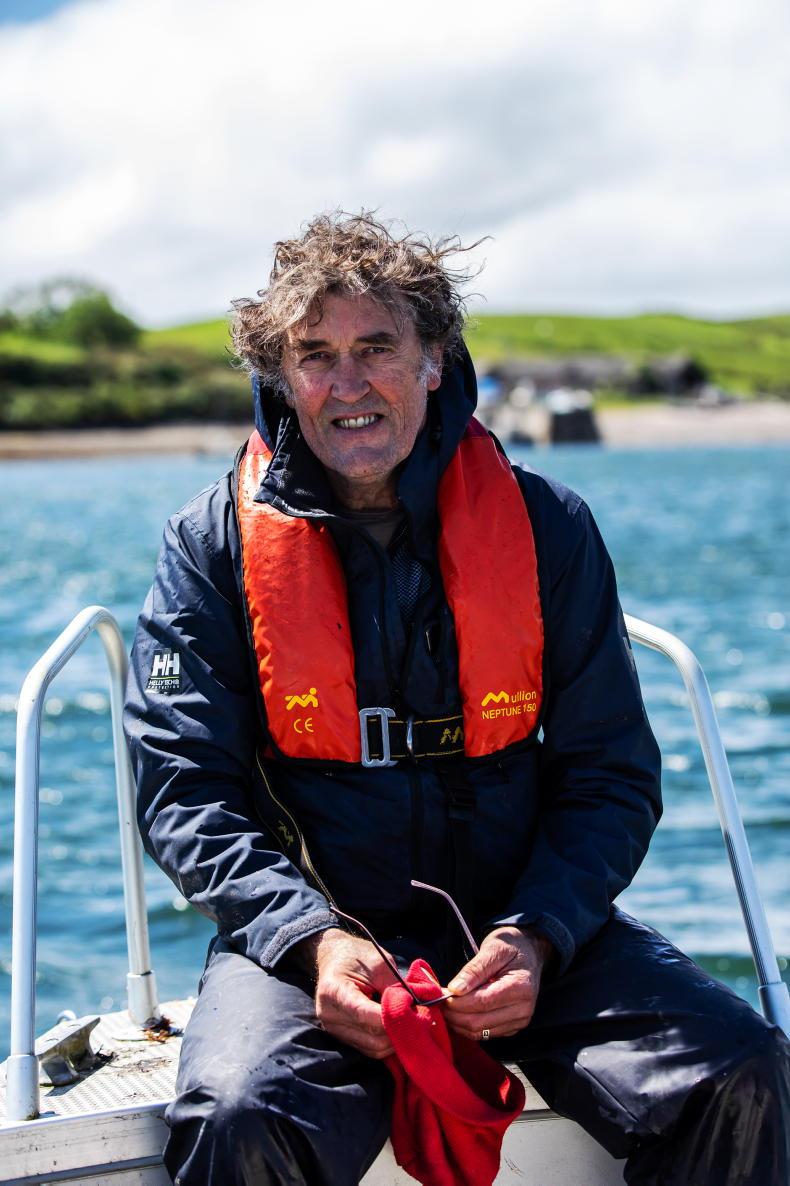
Michael Mulloy owns and operate Blackshell Farm Ltd in Clew Bay, Co Mayo. \ Philip Doyle
While our photographer Philip has a chat with Michael, I enjoy a gorgeous 360° view; hair whipping every which way in the strong coastal wind.
Croagh Patrick is at our backs. In the foreground is Clew Bay. Dotted with sparsely or completely uninhabited islands, the view of the ocean from here is breathtaking –or is that the wind again?
Indeed, the road just seems to stop at the water. And that’s where we park – directly on the small, pebbly beach. There is a small boat moored to the shore that we’re taking to a larger boat – this will then take us to Michael’s mussel harvesting boat, the Ktema.
Rope grown mussels
Mussels – particularly the rope-grown variety – are interesting for a few different reasons. 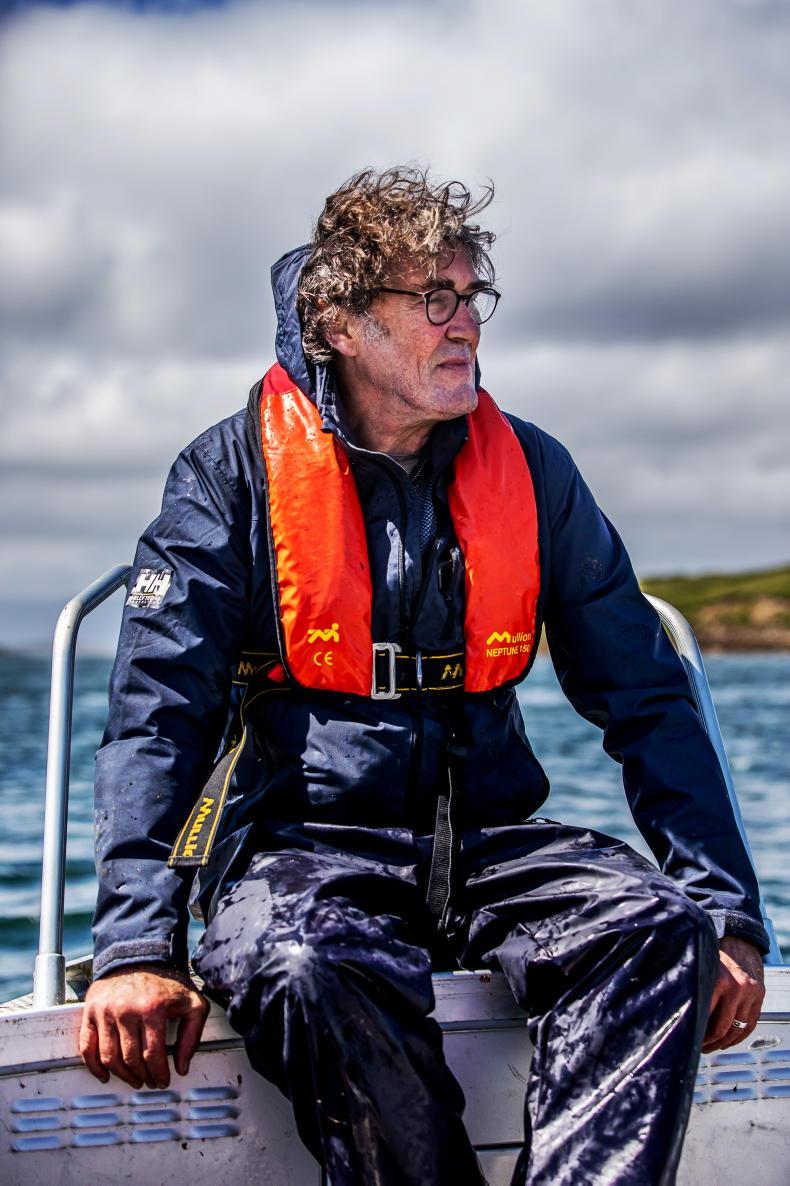
They’re healthy, plentiful, delicious and – to top it all off – Ireland’s mussel industry is considered the most sustainable fishery in the country. Even those who avoid seafood for environmental reasons might happily gorge on a bowl of rope-grown mussels.
“I started this business in 1983,” Michael explains. “It’s a tough business. I started with two other partners and very little money. We just worked our way through; buying bigger boats and reinvesting constantly. We were on our own, there was no one else here on Clew Bay to benchmark our activity against. In other bays there were farms, but we all have our own unique environmental differences, which can seem subtle but are actually critical.”
Originally, there were few Irish buyers for Michael’s mussels.
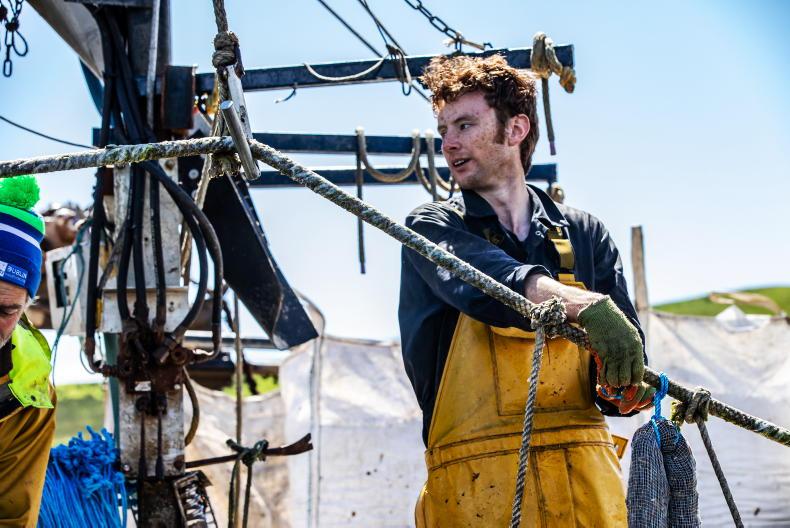
Dylan Stanaway is working as a crew member on The Ktema during his summer holidays from the University of Limerick. \ Philip Doyle
He started working in live exports, mainly shipping the mussels to France when their own season was in a lull, or if demand increased. This wasn’t an ideal situation as it meant their peak harvesting times were during the winter months and the market was unstable.
Problems faced
“We started working with Connemara Seafood, which still processes our mussels,” Michael says.
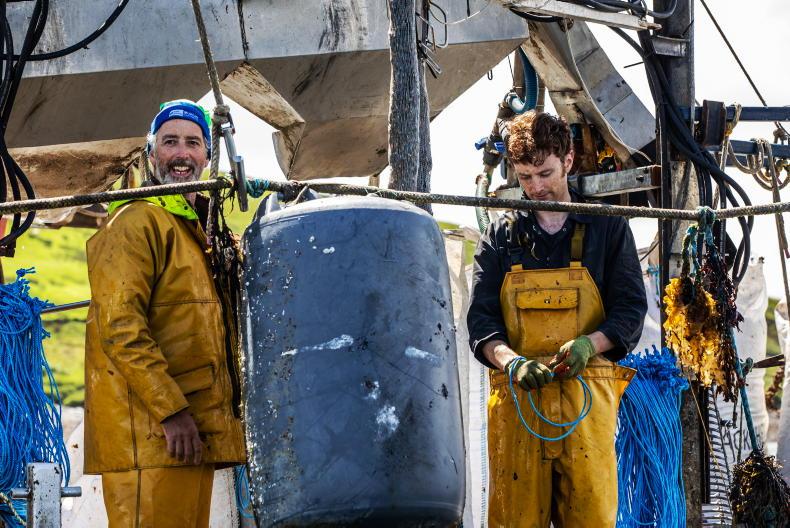
The Ktema is a specialised mussel harvesting boat of Michael's own design. \ Philip Doyle
“We’ve been working together for 35 years; they bought our mussels for fresh export. You were always relying on a gap in the market in France. Then, Connemara started cooking mussels and vac packing at a plant just 6km by boat from our growing areas. We unload the boat at the plant avoiding road transport.
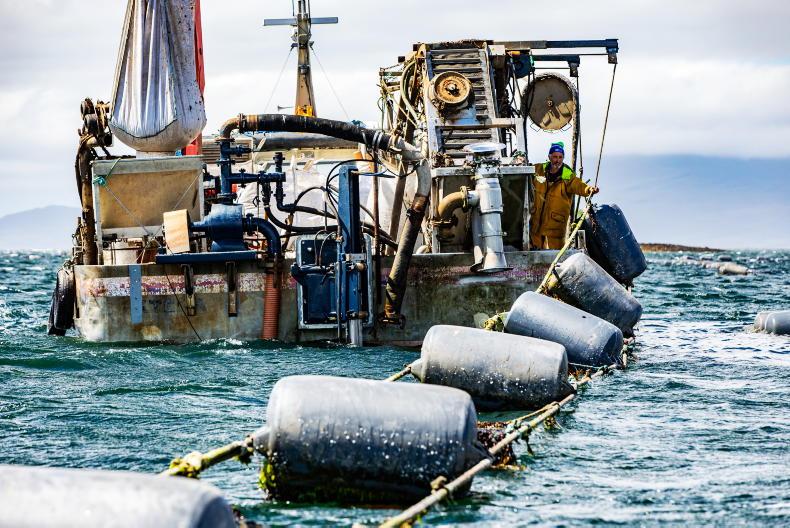
The mussel ropes are suspended in the water by floats – the mussels can then be threaded onto the boat when ready for harvesting. \ Philip Doyle
“So from there our mussels go off to different brands throughout Europe. They’re readily available and easy to cook. Suddenly, we could harvest all year round, but the downside to this (processing and long shelf life) is your location no longer matters. Some processing companies established in Chile, where labour is cheaper, and we had a flood of processed Chilean blue mussels – the end result of that is we’re selling mussels close to the same price now as we were in 1984.”
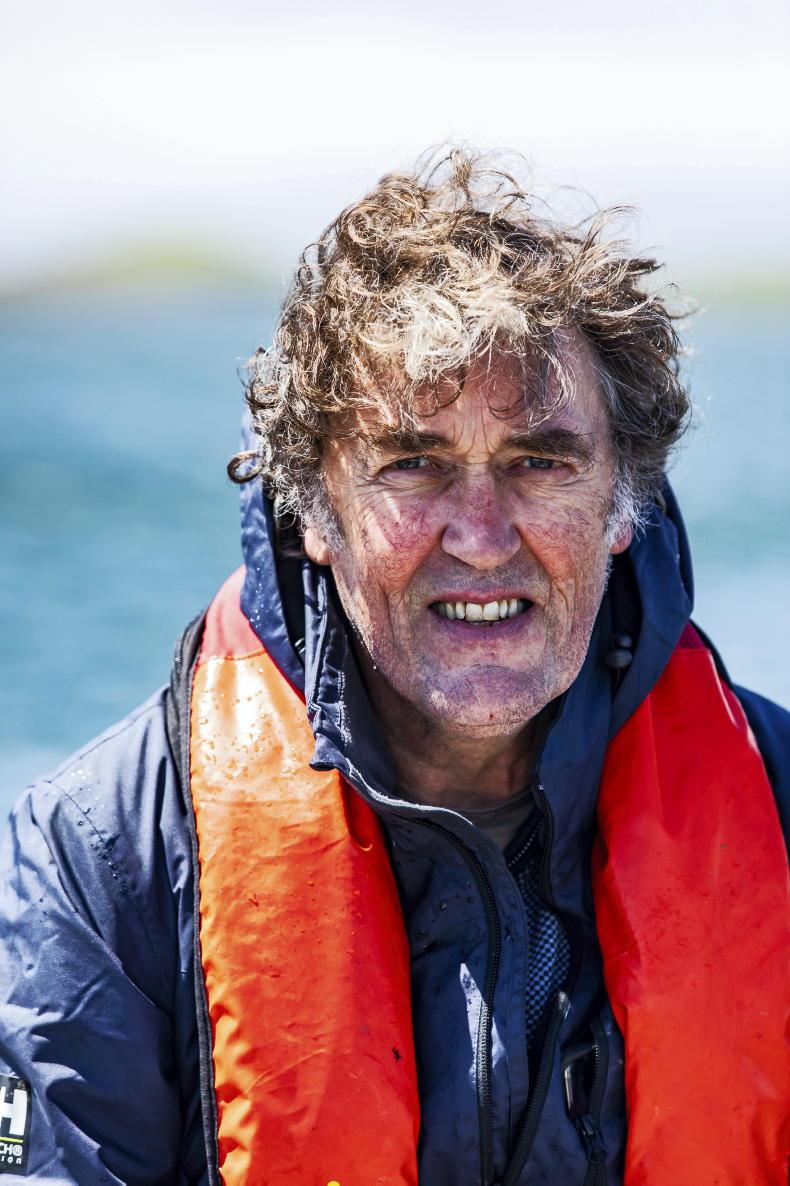
Michael Mulloy owns and operate Blackshell Farm Ltd in Clew Bay, Co Mayo. \ Philip Doyle
The sun comes out as our boat approaches the farm and the Ktema. The skipper is a local man named Paul Reynolds, who has been working with Michael for 20 years. This summer he is being assisted by Dylan Stanaway, who is on summer holidays from the University of Limerick.
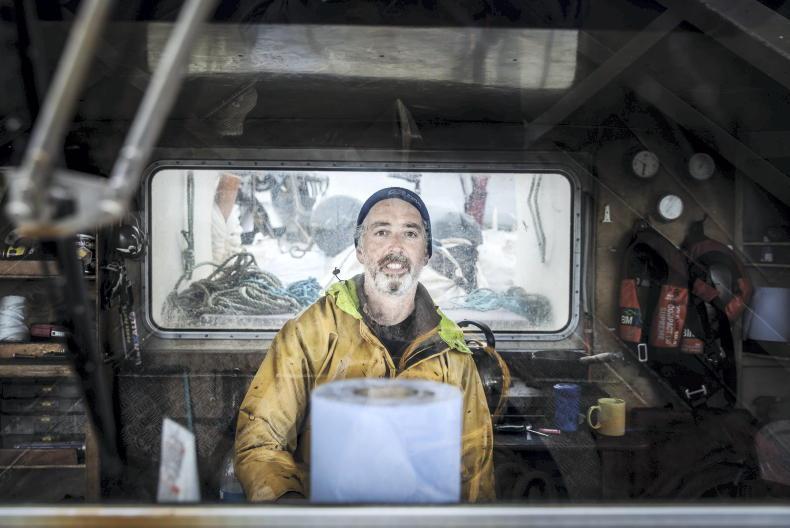
Paul Reynolds is the skipper of The Ktema. He has been working with Michael for 20 years. \ Philip Doyle
Although the water here is fairly deep (ranging from eight to 20m), you can nearly see right down to the bottom. Fish dart past and jellyfish float around the surface of the water. The increase in jellyfish over the past few years is thought to coincide with increasing sea temperatures and, in some cases, has had a negative effect on fishing.
“We’ve been seeing a lot of jellyfish in the past while,” Paul comments. “Including some really big Lion’s Manes.”
The farming process
You can also see the mussels hanging beneath the surface, which are growing in specialised, continuous cotton ‘socks’. These socks get knitted in Michael’s manufacturing and office space in Westport.
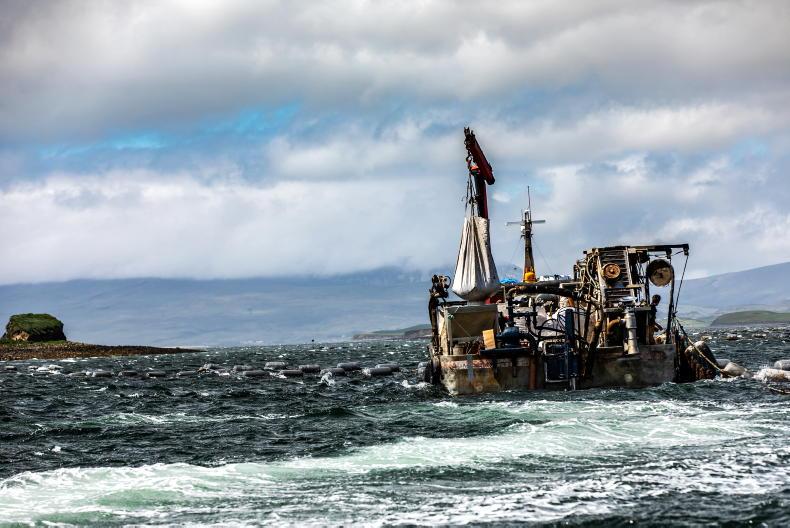
Clew Bay is an ideal place for a mussel farm – it has clean, high-quality water, good depth and is relatively isolated. \ Philip Doyle
At certain growth stages, the mussels are put into the socks (they look like large sausages) which are then hung from the ropes. But why is this method considered so sustainable? Michael says that with mussel farming, all you’re doing is taking advantage of a naturally occurring process.
“When I explain it to people, I say: Picture a hillside and you put stakes in the ground – just bonk them in there – and run a thread of wire in between the two stakes. Come back two weeks later and there’s loads of tiny things you can just pick off with your fingers and eat. Come back two weeks later, again, and there’s loads more. Zero dosing, feeding, treating – nothing.
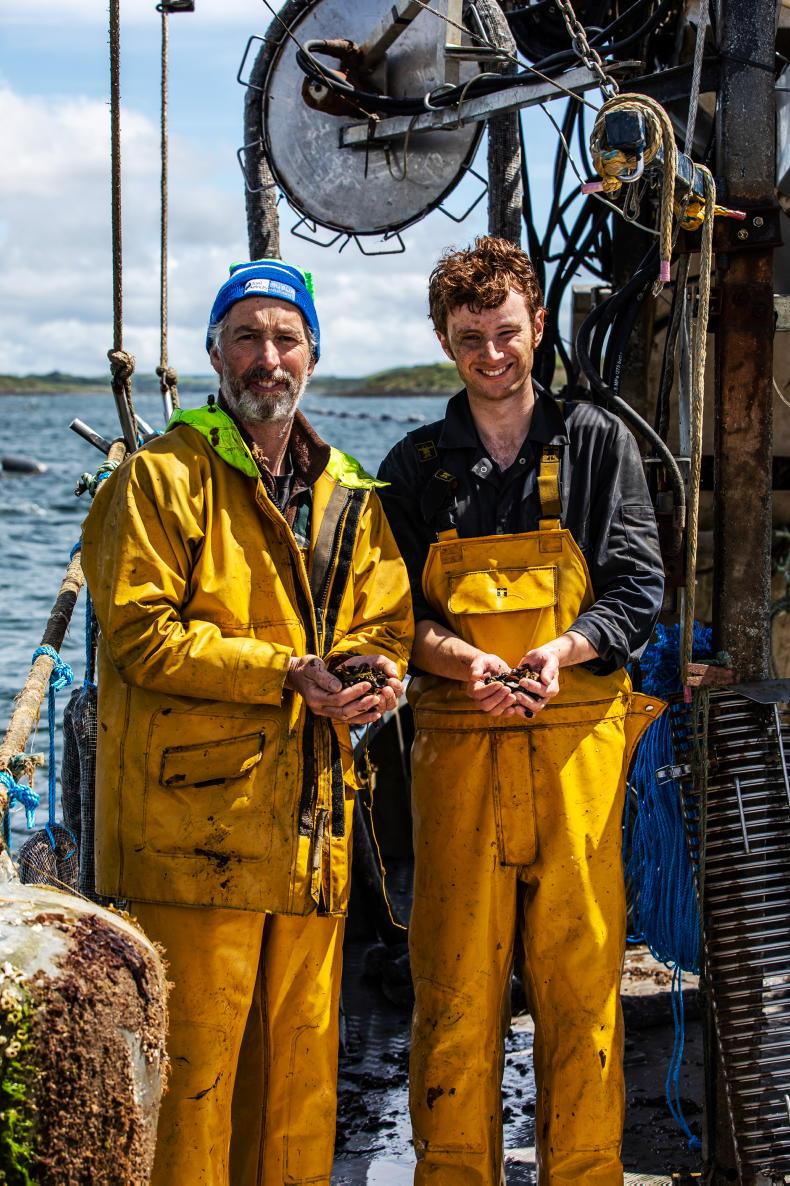
Skipper of The Ktema Paul Reynolds (left) and crew member Dylan Stanaway (right). \ Philip Doyle
“It’s tricky though, you have environmental constraints,” he continues. “You need a depth of water and you need non-toxic water. Most places in Ireland aren’t suitable [for mussel farms]. In enclosed bays you have problems – for example, E coli bacteria would be more of a problem there than in exposed bays. [In Clew Bay], we have Class A water as a result of low levels of E Coli. It’s tested once a month for classification purposes and tested for biotoxins once a week. Phytoplankton samples are collected for analysis once a week. It’s very closely monitored.”
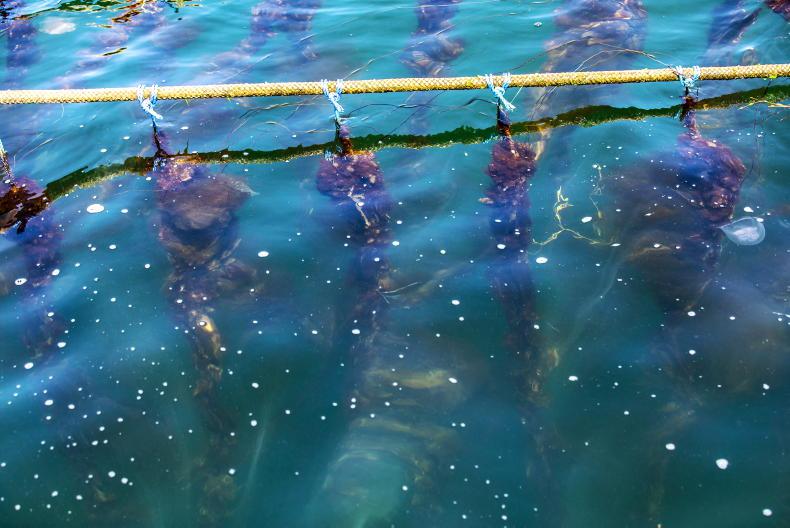
The mussels are added to cotton sleeves and left to grow from the ropes. \ Philip Doyle
A natural process
Mussels naturally spawn each year in late spring or early May. The larvae (called “spat”) swim in the open water for roughly three weeks before growing something called a “foot” and looking for something on which to settle. They will naturally attach themselves to the rope laid by Michael and his team by their “foot” (which will then become their ‘beard’).
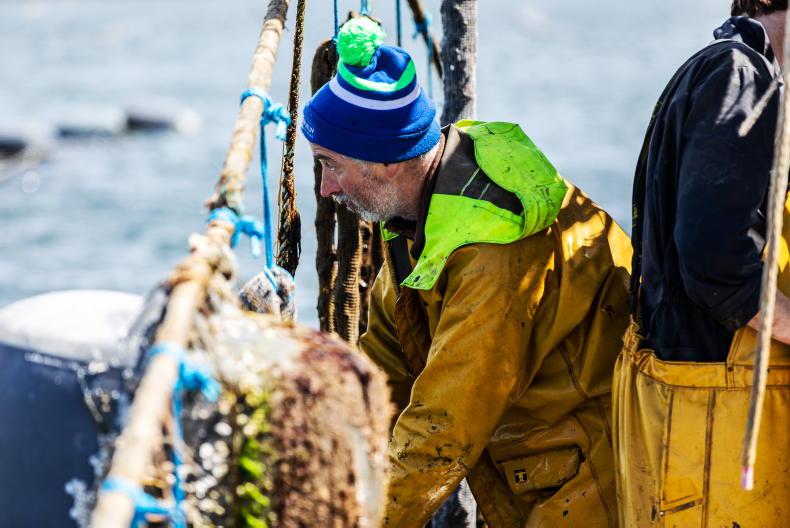
Mussels are checked on the boat prior to harvesting or rebagging. \ Philip Doyle
“We use a longline system of floatation (each being 150m long) with floats attached,” Michael explains. “We attach thousands of metres of collector rope to these longlines to catch the free-swimming spat at the time of year when this spat is looking for a place to settle. In the early days, we didn’t know if there was enough mussel spat in Clew Bay, so we collected spat from nearby Killary Harbour.
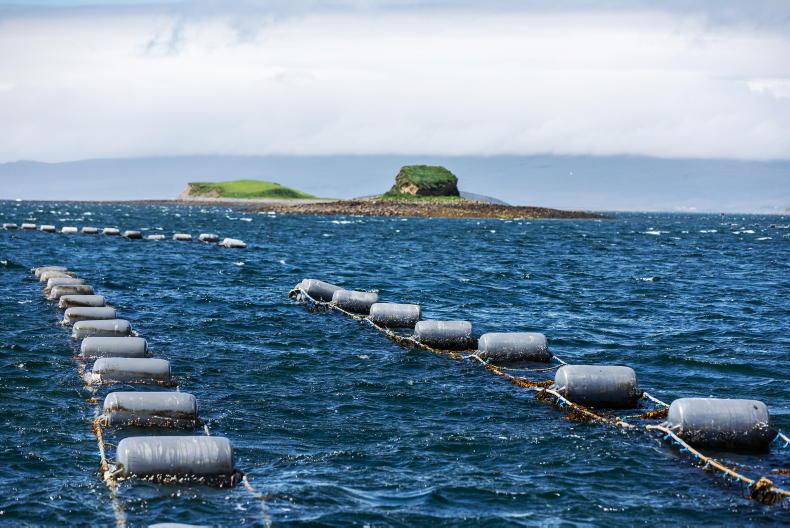
The mussel farm is low impact and doesn't interfere with other marine life. \ Philip Doyle
“We hang out the weighted rope in the water and the mussel spat will settle on those in huge numbers – like tens of billions,” he continues. “We grow the spat on the rope for two months and then we take them off and sock them into the cotton, which supports the young mussels until they are able to attach themselves to the growrope with their own thread (or byssuss).
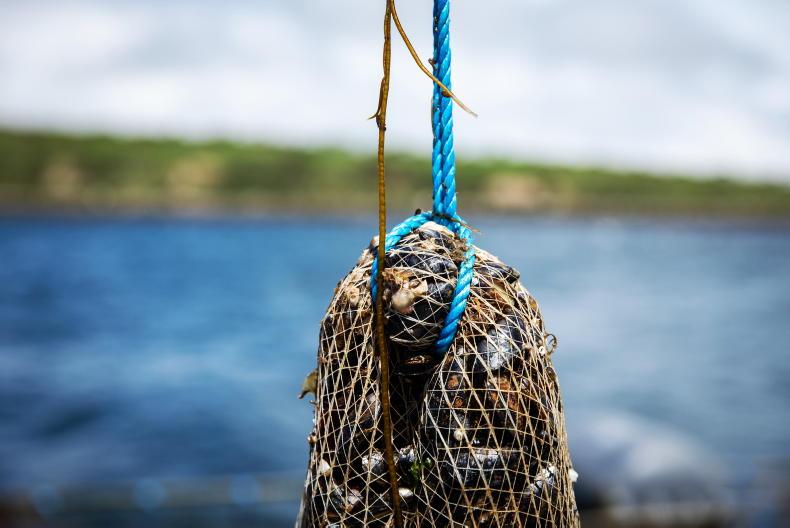
The mussels are grown in cotton sleeves, which, when full, look like large sausages. \ Philip Doyle
The cotton naturally biodegrades in the water in about four weeks. Then we leave them until the following summer when we’ll tube them again before leaving them to the subsequent spring when they begin to reach a market size.”
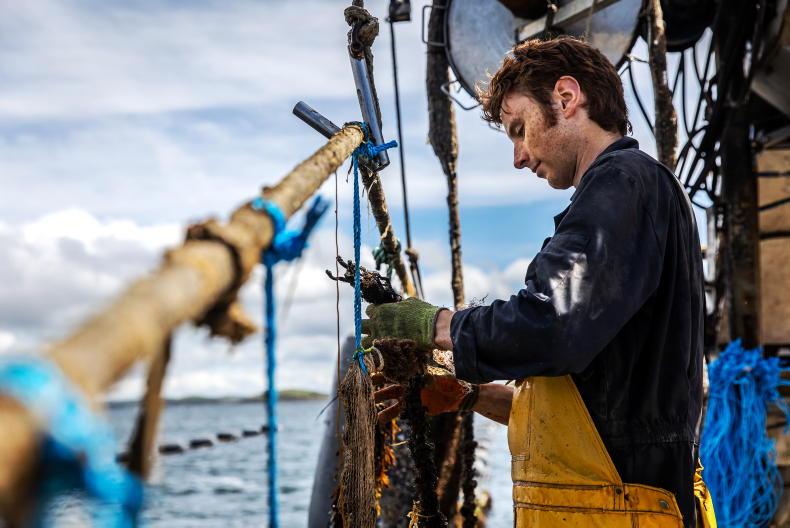
The mussels are checked and monitored for quality and growth. \ Philip Doyle
They harvest the mussels when they are about two years of age or 50-55mm in size. Michael’s team uses colour-coded maps to designate the different stages of mussel growth to allow for continuous, ongoing harvesting. The red lines on the map are ropes ready for harvesting, while other colours (blue, green) indicate other growth stages.
Low impact
Michael acknowledges that every human activity has an impact but, in general, mussel farms have a minimal negative effect on surrounding sea life and biodiversity.
“Seals will often sunbathe on the floats,” he says. “They actually prefer to sunbathe here as they’re closer to the water – the tide doesn’t move away from them.”
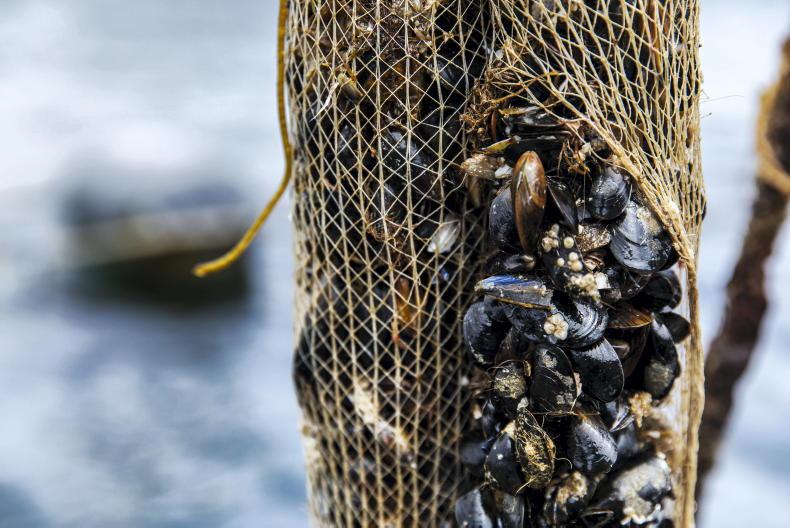
Blackshell Farm rope grown mussels in Co Mayo. \ Philip Doyle
Unique design
The Ktema’s harvesting design is unique – a result of Michael’s world travels. From Canada and the US to New Zealand and all over Europe, Michael has visited rope mussel farms to learn from other farmers. Of course, each mussel farm is located within a unique environment, so when Michael mechanised his harvesting boat, he took elements from each location and made something which would work for Clew Bay.
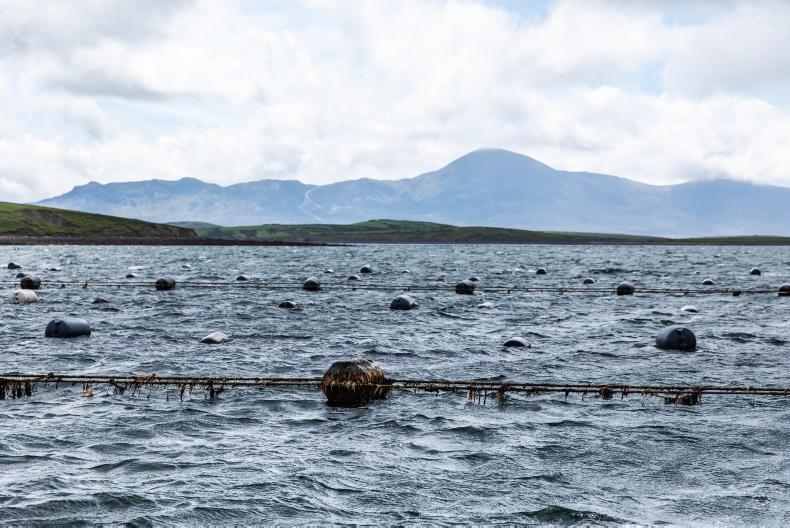
The mussel farm in Clew Bay, Co Mayo. \ Philip Doyle
As a result, in 2003 he started bringing in specialised growrope from New Zealand. The mussel-laden ropes get threaded into the boat’s harvesting mechanism where they are automatically stripped from the rope, washed, graded and bagged.
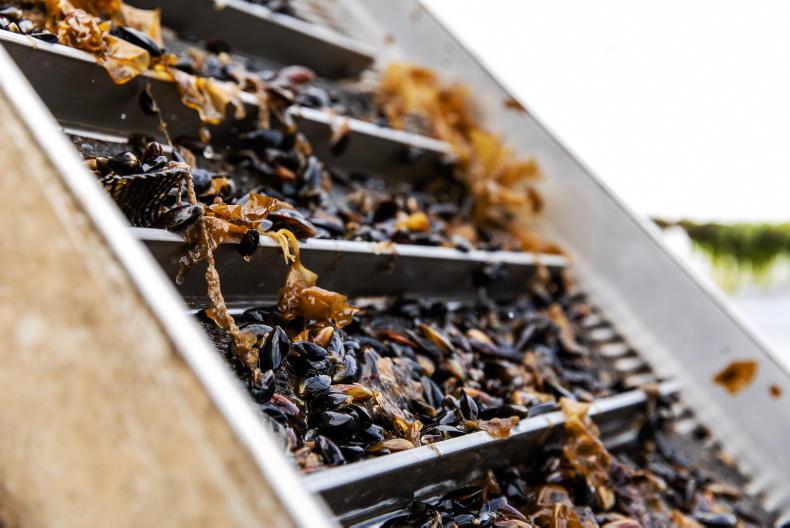
Mussels are automatically graded and sorted as they come onto the boat. \ Philip Doyle
“We would have 14 people working when we first started and we’d get maybe seven tonnes a day harvesting – now we have two people working [the boat] and we can comfortably harvest 24 tonnes in a day,” he says. “It was all about adapting systems which were perfected in other countries. We started importing the rope because having one continuous rope means you can mechanise more easily. The mussels just roll on to the boat.”
Aquaculture issues
Michael is currently the chair of the aquaculture section of the Irish Farmer’s Association (IFA). He says there are many issues, both at a national and a European level, currently holding back innovation in Irish aquaculture.
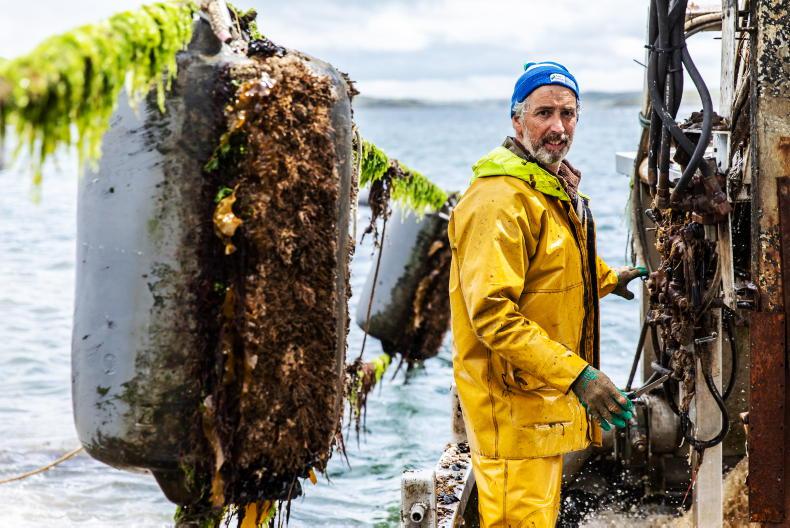
Paul Reynolds is the skipper of The Ktema. He has been working with Michael for 20 years. \ Philip Doyle
“There are always ways of reducing the threat to the environment in seafood production and I believe aquaculture has a huge and growing part to play in this,” he explains. “We have a good story to tell which will, in time, inform Government and EU policy. Policy is changing, the reality that aquaculture is here to stay is dawning. I believe that we can look forward to a more informed, progressive system here and in Europe in the near future.”
Filter feeding bivalves
Michael tells Irish Country Living that at Blackshell Farm they operate to an organic standard and have won an award for sustainable and socially responsible business. This is the direction he wants his business to continue to take.
“There’s lots of good press about bivalves, generally because they function to actually improve water quality (being filter feeders) and they are a sustainable fishery.
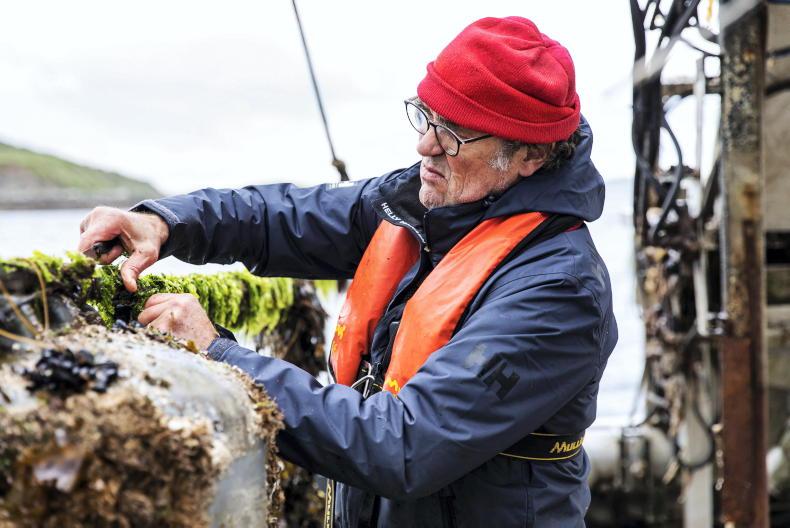
Michael Mulloy owns and operates Blackshell Farm Ltd. \ Philip Doyle
“I also think mussels are becoming a more popular option with Irish consumers,” he adds. “Retail sales in Ireland increased 72% in 2020 over 2019. The majority of our mussels are processed, but we also supply fresh pallet-loads to France on a seasonal, weekly basis and bulk loads to the Netherlands.”
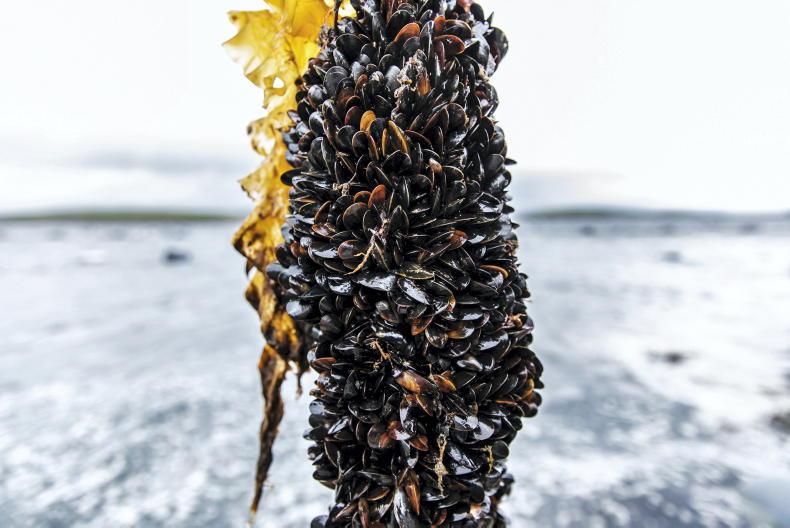
Mussels occur naturally in the water and automatically look for something to latch onto and grow. \ Philip Doyle
They are rich in protein and low in calories.Gram per gram; they contain more iron than beef.They contain zinc, iodine and selenium.They are a rich source of Vitamins B1, B2, B12 and E.They have a low environmental impact on marine environments.They can improve water quality: one mussel can filter up to 65L of water per day.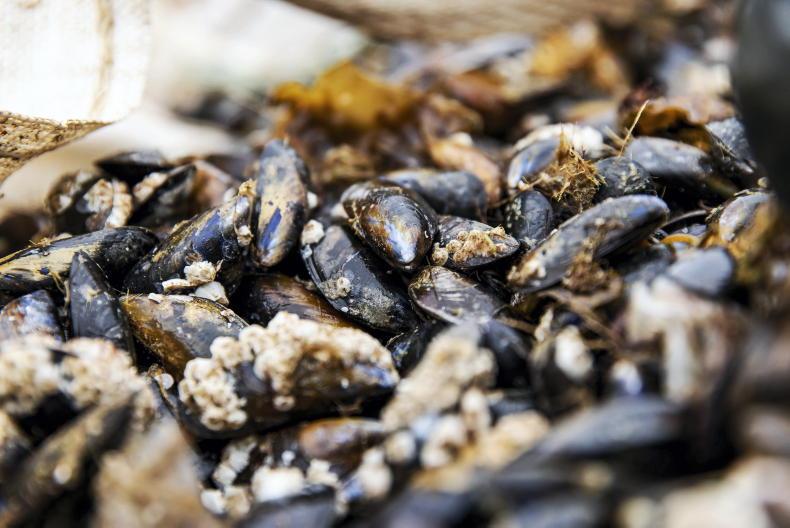
Mussels are a sustainable, healthy choice if you enjoy eating seafood. \ Philip Doyle
The Irish mussel industry is the only Irish fishery currently certified by the Marine Stewardship Council.
Read more
Murky waters
Regenerative farming: permaculture; a whole systems approach
“Where are we even going?” I’m thinking to myself as we drive closer to the open water. We are coming from Westport, Co Mayo, to nearby Clew Bay to visit Blackshell Farm – a rope mussel farm run by enterprising local Michael Mulloy.
Looking ahead, I can’t see a road – or a place to park.
We cross a tiny causeway with a wall on one side, climb a very steep hill and get out of the jeep.

Michael Mulloy owns and operate Blackshell Farm Ltd in Clew Bay, Co Mayo. \ Philip Doyle
While our photographer Philip has a chat with Michael, I enjoy a gorgeous 360° view; hair whipping every which way in the strong coastal wind.
Croagh Patrick is at our backs. In the foreground is Clew Bay. Dotted with sparsely or completely uninhabited islands, the view of the ocean from here is breathtaking –or is that the wind again?
Indeed, the road just seems to stop at the water. And that’s where we park – directly on the small, pebbly beach. There is a small boat moored to the shore that we’re taking to a larger boat – this will then take us to Michael’s mussel harvesting boat, the Ktema.
Rope grown mussels
Mussels – particularly the rope-grown variety – are interesting for a few different reasons. 
They’re healthy, plentiful, delicious and – to top it all off – Ireland’s mussel industry is considered the most sustainable fishery in the country. Even those who avoid seafood for environmental reasons might happily gorge on a bowl of rope-grown mussels.
“I started this business in 1983,” Michael explains. “It’s a tough business. I started with two other partners and very little money. We just worked our way through; buying bigger boats and reinvesting constantly. We were on our own, there was no one else here on Clew Bay to benchmark our activity against. In other bays there were farms, but we all have our own unique environmental differences, which can seem subtle but are actually critical.”
Originally, there were few Irish buyers for Michael’s mussels.

Dylan Stanaway is working as a crew member on The Ktema during his summer holidays from the University of Limerick. \ Philip Doyle
He started working in live exports, mainly shipping the mussels to France when their own season was in a lull, or if demand increased. This wasn’t an ideal situation as it meant their peak harvesting times were during the winter months and the market was unstable.
Problems faced
“We started working with Connemara Seafood, which still processes our mussels,” Michael says.

The Ktema is a specialised mussel harvesting boat of Michael's own design. \ Philip Doyle
“We’ve been working together for 35 years; they bought our mussels for fresh export. You were always relying on a gap in the market in France. Then, Connemara started cooking mussels and vac packing at a plant just 6km by boat from our growing areas. We unload the boat at the plant avoiding road transport.

The mussel ropes are suspended in the water by floats – the mussels can then be threaded onto the boat when ready for harvesting. \ Philip Doyle
“So from there our mussels go off to different brands throughout Europe. They’re readily available and easy to cook. Suddenly, we could harvest all year round, but the downside to this (processing and long shelf life) is your location no longer matters. Some processing companies established in Chile, where labour is cheaper, and we had a flood of processed Chilean blue mussels – the end result of that is we’re selling mussels close to the same price now as we were in 1984.”

Michael Mulloy owns and operate Blackshell Farm Ltd in Clew Bay, Co Mayo. \ Philip Doyle
The sun comes out as our boat approaches the farm and the Ktema. The skipper is a local man named Paul Reynolds, who has been working with Michael for 20 years. This summer he is being assisted by Dylan Stanaway, who is on summer holidays from the University of Limerick.

Paul Reynolds is the skipper of The Ktema. He has been working with Michael for 20 years. \ Philip Doyle
Although the water here is fairly deep (ranging from eight to 20m), you can nearly see right down to the bottom. Fish dart past and jellyfish float around the surface of the water. The increase in jellyfish over the past few years is thought to coincide with increasing sea temperatures and, in some cases, has had a negative effect on fishing.
“We’ve been seeing a lot of jellyfish in the past while,” Paul comments. “Including some really big Lion’s Manes.”
The farming process
You can also see the mussels hanging beneath the surface, which are growing in specialised, continuous cotton ‘socks’. These socks get knitted in Michael’s manufacturing and office space in Westport.

Clew Bay is an ideal place for a mussel farm – it has clean, high-quality water, good depth and is relatively isolated. \ Philip Doyle
At certain growth stages, the mussels are put into the socks (they look like large sausages) which are then hung from the ropes. But why is this method considered so sustainable? Michael says that with mussel farming, all you’re doing is taking advantage of a naturally occurring process.
“When I explain it to people, I say: Picture a hillside and you put stakes in the ground – just bonk them in there – and run a thread of wire in between the two stakes. Come back two weeks later and there’s loads of tiny things you can just pick off with your fingers and eat. Come back two weeks later, again, and there’s loads more. Zero dosing, feeding, treating – nothing.

Skipper of The Ktema Paul Reynolds (left) and crew member Dylan Stanaway (right). \ Philip Doyle
“It’s tricky though, you have environmental constraints,” he continues. “You need a depth of water and you need non-toxic water. Most places in Ireland aren’t suitable [for mussel farms]. In enclosed bays you have problems – for example, E coli bacteria would be more of a problem there than in exposed bays. [In Clew Bay], we have Class A water as a result of low levels of E Coli. It’s tested once a month for classification purposes and tested for biotoxins once a week. Phytoplankton samples are collected for analysis once a week. It’s very closely monitored.”

The mussels are added to cotton sleeves and left to grow from the ropes. \ Philip Doyle
A natural process
Mussels naturally spawn each year in late spring or early May. The larvae (called “spat”) swim in the open water for roughly three weeks before growing something called a “foot” and looking for something on which to settle. They will naturally attach themselves to the rope laid by Michael and his team by their “foot” (which will then become their ‘beard’).

Mussels are checked on the boat prior to harvesting or rebagging. \ Philip Doyle
“We use a longline system of floatation (each being 150m long) with floats attached,” Michael explains. “We attach thousands of metres of collector rope to these longlines to catch the free-swimming spat at the time of year when this spat is looking for a place to settle. In the early days, we didn’t know if there was enough mussel spat in Clew Bay, so we collected spat from nearby Killary Harbour.

The mussel farm is low impact and doesn't interfere with other marine life. \ Philip Doyle
“We hang out the weighted rope in the water and the mussel spat will settle on those in huge numbers – like tens of billions,” he continues. “We grow the spat on the rope for two months and then we take them off and sock them into the cotton, which supports the young mussels until they are able to attach themselves to the growrope with their own thread (or byssuss).

The mussels are grown in cotton sleeves, which, when full, look like large sausages. \ Philip Doyle
The cotton naturally biodegrades in the water in about four weeks. Then we leave them until the following summer when we’ll tube them again before leaving them to the subsequent spring when they begin to reach a market size.”

The mussels are checked and monitored for quality and growth. \ Philip Doyle
They harvest the mussels when they are about two years of age or 50-55mm in size. Michael’s team uses colour-coded maps to designate the different stages of mussel growth to allow for continuous, ongoing harvesting. The red lines on the map are ropes ready for harvesting, while other colours (blue, green) indicate other growth stages.
Low impact
Michael acknowledges that every human activity has an impact but, in general, mussel farms have a minimal negative effect on surrounding sea life and biodiversity.
“Seals will often sunbathe on the floats,” he says. “They actually prefer to sunbathe here as they’re closer to the water – the tide doesn’t move away from them.”

Blackshell Farm rope grown mussels in Co Mayo. \ Philip Doyle
Unique design
The Ktema’s harvesting design is unique – a result of Michael’s world travels. From Canada and the US to New Zealand and all over Europe, Michael has visited rope mussel farms to learn from other farmers. Of course, each mussel farm is located within a unique environment, so when Michael mechanised his harvesting boat, he took elements from each location and made something which would work for Clew Bay.

The mussel farm in Clew Bay, Co Mayo. \ Philip Doyle
As a result, in 2003 he started bringing in specialised growrope from New Zealand. The mussel-laden ropes get threaded into the boat’s harvesting mechanism where they are automatically stripped from the rope, washed, graded and bagged.

Mussels are automatically graded and sorted as they come onto the boat. \ Philip Doyle
“We would have 14 people working when we first started and we’d get maybe seven tonnes a day harvesting – now we have two people working [the boat] and we can comfortably harvest 24 tonnes in a day,” he says. “It was all about adapting systems which were perfected in other countries. We started importing the rope because having one continuous rope means you can mechanise more easily. The mussels just roll on to the boat.”
Aquaculture issues
Michael is currently the chair of the aquaculture section of the Irish Farmer’s Association (IFA). He says there are many issues, both at a national and a European level, currently holding back innovation in Irish aquaculture.

Paul Reynolds is the skipper of The Ktema. He has been working with Michael for 20 years. \ Philip Doyle
“There are always ways of reducing the threat to the environment in seafood production and I believe aquaculture has a huge and growing part to play in this,” he explains. “We have a good story to tell which will, in time, inform Government and EU policy. Policy is changing, the reality that aquaculture is here to stay is dawning. I believe that we can look forward to a more informed, progressive system here and in Europe in the near future.”
Filter feeding bivalves
Michael tells Irish Country Living that at Blackshell Farm they operate to an organic standard and have won an award for sustainable and socially responsible business. This is the direction he wants his business to continue to take.
“There’s lots of good press about bivalves, generally because they function to actually improve water quality (being filter feeders) and they are a sustainable fishery.

Michael Mulloy owns and operates Blackshell Farm Ltd. \ Philip Doyle
“I also think mussels are becoming a more popular option with Irish consumers,” he adds. “Retail sales in Ireland increased 72% in 2020 over 2019. The majority of our mussels are processed, but we also supply fresh pallet-loads to France on a seasonal, weekly basis and bulk loads to the Netherlands.”

Mussels occur naturally in the water and automatically look for something to latch onto and grow. \ Philip Doyle
They are rich in protein and low in calories.Gram per gram; they contain more iron than beef.They contain zinc, iodine and selenium.They are a rich source of Vitamins B1, B2, B12 and E.They have a low environmental impact on marine environments.They can improve water quality: one mussel can filter up to 65L of water per day.
Mussels are a sustainable, healthy choice if you enjoy eating seafood. \ Philip Doyle
The Irish mussel industry is the only Irish fishery currently certified by the Marine Stewardship Council.
Read more
Murky waters
Regenerative farming: permaculture; a whole systems approach



























 This is a subscriber-only article
This is a subscriber-only article










SHARING OPTIONS: